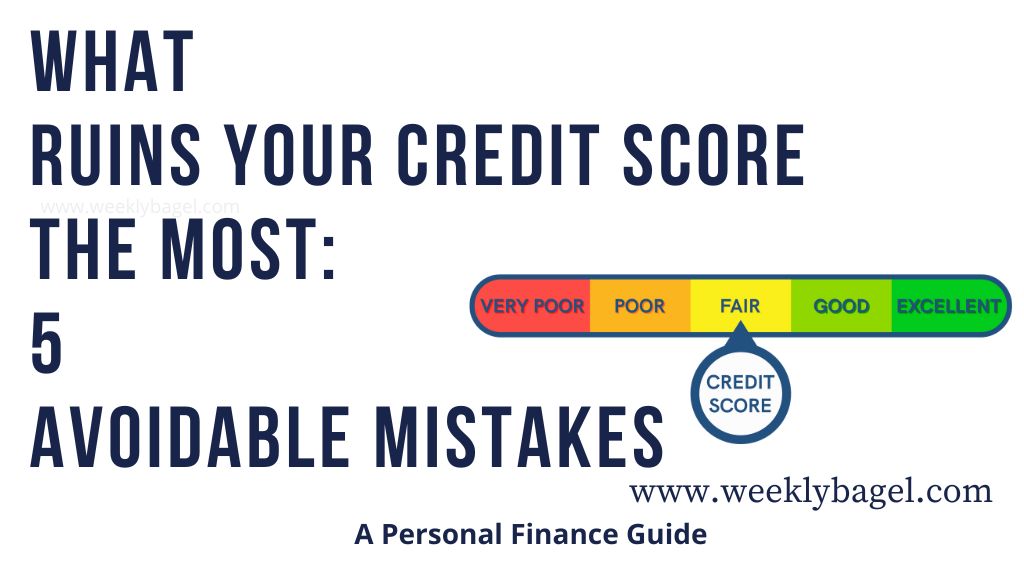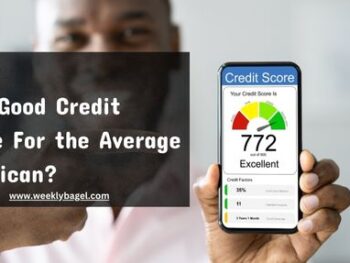
Awhile ago, I discussed what you need to know about credit score and its impact in your life. It is imperative your credit history in the United States is good. This is because banks and credit companies welcome you with an open arm, when you have a good credit.
Financial institutions are more likely to give you full access to their financial products, due to a proof of financial integrity on your side. Hence, the importance of maintaining a great credit.
Although it takes quite some time to build a good credit, it does not take much to damage it. It is always a good idea to check your credit score. This is to avoid situations such as the one below.
What Hurts Credit Score
Here are what most influences your credit score negatively:
1. Missing A Monthly Payment
A missed payment has the biggest impact on your credit score.
According to Wells Fargo Bank, 35% of your payments in a year contribute to your credit ratings. What this means, is one-third of your credit score is a result of your payment history. Each time you make a payment, a creditor reports it to a credit bureau.
Now, this credit report can be derogatory or good. It all depends on when such payments are made. If you ever missed a monthly payment, it will be reported to a credit bureau as such. As a result, you will be penalized by having your credit score reduced.
In addition, your credit history will contain a missed payment. Any time a creditor looks up your credit history, it will show you missed a payment some time in the past. Potential creditors will see this as a problem, when there are a series of missed payments on your credit file.
And, it may result in you getting rejected for any loans, credit card or other financial products you might as well have been qualified for.
2. Discount On Debt Settlement With A Debt Collector
Whenever debt collectors call to collect, they often have a trick where they offer you a discount on your debt. According to them, this is supposed to get you to pay less than what you actually owe. Sounds like a great deal, doesn’t it?
Well, it is not. You see- such a deal is one way to ruin your credit score. This is because such a debt discount deal shows up on your credit history. It will show you were not able to honor your initial debt payment contract, which is paying back your debt in full payment.
So, be sure to pay any debt in full. This is despite the tempting debt settlement offers a debt collector may have to offer to you. Read practical ways to get out of debt in order to avoid getting to a point in your life, where debt collectors are harassing you daily.
3. Defaulting On Loans
A loan default occurs after you fail to repay a debt, beyond the grace period given for such a repayment. The grace period is known as a delinquency period. Once the period is past, you will be penalized severely for defaulting on your loans.
Often, this penalty comes as a reduction of points on your credit score. You can lose as much as 70 points. Yes- a loan default makes your credit bad.
How Long Can Negative Items Stay On Credit Report
A loan default can stay on your credit file for up to six years. Even when the debt is paid off, the loan default will continue to be a part of your credit history. But, it goes away at the end of six years.
As long as you never default on the same debt again, you will be fine. Otherwise, it will set a cascade which destroys your credit score. Besides, it takes a long time to purge the default out of your credit history.
So, please try not to default on your loans. If you are ever in a delinquency period, try reaching out to your loan provider in order to consider repayment options. In the case of a defaulted student loan, read my article- How To Get Out Of Student Loan Default Now without damaging your credit score.
4. Size and Number Of Your Current Debts
Remember the Wells Fargo Bank article I cited earlier?
It claims the size and number of debts you owe, can contribute to 30% of your credit score. What this means, is your credit score depends on how many debts you carry. Here is what I mean.
If you are a holder of a few credit cards with a huge debt and an average yearly income, you are at risk for loan default. You can easily ruin your credit score, when you default on one of your debts. This is especially, when you make multiple payments to multiple financial parties.
This is why it is recommended to always check your debt-to-income ratio, prior to acquiring new debt. Since your debt size contributes to 30% of your credit score, it would make sense to keep your debts within what you can afford. Otherwise, you will have a bad credit history of missed payments and defaulted loans.
As a result, your credit will be ruined.
5. Length Of Credit History
The first time I used a credit card to build my credit score. I immediately paid off the credit card debt and cancelled the credit card. Guess what happened to my credit score, my good reader?
It dropped by 59 points!
The issue is the length of your credit history contributes to 15% of your credit score. In other words, having credit line for a short period of time will not create a good credit history. A credit card is a credit line.
One of the consequences of a sudden closure of a credit card within a short period of getting it, is it affects your credit score negatively. This is because it limits the number of credit lines available to you. Look at it this way.
The longer you have a line of credit without any late payment, the better your credit history and credit score look. Any potential creditor looking at your credit history would expect the trend to continue. So, it works on your favor.
Now, I am not advocating spending too much on your credit card or any other line of credit. Just keep it longer than six months. This is because it is one of those things that affect credit score.
6. A Maxed Out Credit Card
What is considered a maxed-out credit card?
A maxed credit card is one where you have reached your credit amount limit. A maxed out credit card hurts your credit. This is because credit card utilization is rated. What I mean by this, is a high credit card utilization is viewed negatively.
This is especially, when there is a struggle in paying back a maxed out credit card. If you reach your credit limit without paying it down for awhile, it will be delinquent. You lose credit points as a result. This is especially, when the issuer decides to lock your card to prevent further use.
You can read my article, Should You Max Out A Credit Card?. I discussed more about this issue in the article. Having said that, try to keep your credit card utilization around 40% to 50% to avoid damaging your credit score.
In Conclusion Of What Hurts Your Credit Score the Most
To conclude this article, I want to emphasize the importance of checking your credit score. This is to keep tabs on any negative report on your credit history which may affect your score. There are a couple places to check your credit score.
Surely, you can look up your credit score weekly without hurting your credit score.
You can use myFICO to check your credit score. Financial institutions use myFICO credit score to ascertain your qualifications for low interest on loans. Besides, it has the most accurate credit score out there.
Any negative impact on your credit score can be ratified on time, if you check your credit score regularly. The last thing you want is to discover you have a damaged credit score, at the place you are trying to get a loan or credit card.




 5 Best Budgeting Apps For Controlling Your Monthly Expenditures
5 Best Budgeting Apps For Controlling Your Monthly Expenditures